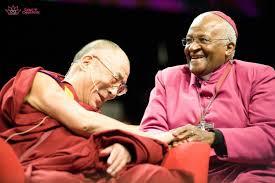About Spiritual Leaders Practicing Mindfulness

If you have ever wanted to study prayer, mindfulness, Zen or enlightenment you may have wondered where to go for expert guidance and who to look towards and learn from. There have been some great masters in the space for sure, but if you ask us, there are three people who have completely changed the way we view ourselves and interact with the world around us. These leaders are Dalai Lama, Thich Nhat Hahn & Desmond Tutu. Who are these great leaders and what can they teach us about prayer, enlightenment and mindfulness? Let’s dive in and find out.

Thich Nhat Hahn
Thich Nhat Hahn is probably one of the most recognized Zen Masters of all time. He was changed the way the world practices peace and mindfulness through his best selling books and powerful teachings. In fact, he has published over 100 titles on Engaged Buddhism, mindfulness and meditation as well as children’s stories, reviewed and commentaries on ancient Buddhist texts and poetry. He is loved worldwide and has taught many generations about developing peace and living happily in the present moment. His works have been published worldwide and translated into many, many languages. He has been instrumental to bringing the West Buddhism and has founded over 1,000 local mindfulness practices, build a community of over 600 monks and nuns, and founded six monasteries and practice centers that dot Europe and America. Because of him, millions of people have been able to learn his teachings and learn how to change the world through their mindfulness and “just being” state of mind. His teachings are taught in prisons, schools, workplaces and homes all across the globe. Martin Luther King called him “An apostle of peace and nonviolence” and the media has dubbed his as “the Zen Master who fills Stadiums”, “The other Dalai Lama”, and “The Father of Mindfulness”. He has taught at several Ivy League universities such as Columbia, and Princeton. He was even kicked exiled out of his own country for 39 years because he was preaching peace and ending hostilities in Vietnam. Even with the exile, he continued his mission and kept his focus on brotherhood, peace and love. He thought everyone could learn the art of mindfulness and “living peace” if they would just practice daily meditation. Because of him, the “art of mindful living” is alive and well and his legacy will live on.
Quotes from Thich Nhat Hahn:
“Letting go gives us freedom, and freedom is the only condition for happiness. If, in our heart, we still cling to anything - anger, anxiety, or possessions - we cannot be free.”
“People usually consider walking on water or in thin air a miracle. But I think the real miracle is not to walk either on water or in thin air, but to walk on earth. Every day we are engaged in a miracle which we don't even recognize: a blue sky, white clouds, green leaves, the black, curious eyes of a child—our own two eyes. All is a miracle.”
“Suffering is not enough. Life is both dreadful and wonderful...How can I smile when I am filled with so much sorrow? It is natural--you need to smile to your sorrow because you are more than your sorrow.”
“When you plant lettuce, if it does not grow well, you don't blame the lettuce. You look for reasons it is not doing well. It may need fertilizer, or more water, or less sun. You never blame the lettuce. Yet if we have problems with our friends or family, we blame the other person. But if we know how to take care of them, they will grow well, like the lettuce. Blaming has no positive effect at all, nor does trying to persuade using reason and argument. That is my experience. No blame, no reasoning, no argument, just understanding. If you understand, and you show that you understand, you can love, and the situation will change”
Dalai LamaThe Dalai Lama has spent his life advocating for humanity and peace. He is the leader of Tibetan Buddhism and has been at odds with the Chinese government for decades because they think he is a terrorist for inciting Tibetan rebellion to Chinese communist practices and ideologies. But of course he’s not a terrorist. He has spent his entire life living the four basic truths make up the entire foundation for Buddhism, which are:
- People are left unsatisfied by trying to make life perfect;
- People can realize there is a better way to achieve fulfillment;
- Life is not perfect;
- By living one's life through wisdom, ethical conduct and mental discipline, people will reach enlightenment
Just like many Buddhists he teaches that consciousness is a fluid thing and the consciousness of one person can pass to another person. He is a charismatic speaker and leader who has displayed compassion and peace. In 1989 he won a Nobel Peace Prize for his non-violent efforts to try and liberate Tibet from the throws of Chinese communism. He has always advocated for mutual respect and tolerance. Though he has spent over 59 years in exile from Tibet, he is still honored at Universities and Organizations all over the world with honorary doctorate degrees and prestigious peace awards.
Quotes from the Dalai Lama:
“It is under the greatest adversity that there exists the greatest potential for doing good, both for oneself and others.”
“People take different roads seeking fulfillment and happiness. Just because they’re not on your road doesn’t mean they’ve gotten lost.”
“My religion is very simple. My religion is kindness.”
“If you want others to be happy, practice compassion. If you want to be happy, practice compassion.”
“There is a saying in Tibetan, ‘Tragedy should be utilized as a source of strength.’ No matter what sort of difficulties, how painful experience is, if we lose our hope, that’s our real disaster.”
Desmond TutuDesmond Tutu is a South African Arch Bishop that has earned awards and multiple honorary degrees from Universities all over Germany, Britain and the United States. He became the Dean of St. Mary’s Cathedral in Johannesburg in 1975 and was the first black to have that position ever. He became the first black General Secretary of the South African Council of Churches in 1978 and has lived his life in pursuit of a just society that acknowledges democracy and is free of racial inequalities. He demanded that equal civil rights be given for all, and that a common system of education be granted to all citizens. He also demanded that forced deportation be stopped. He is an activist, and a champion of human rights. He has won a Nobel Peace Prize, the Gandhi Peace Prize, the Lincoln Leadership Prize, the Bishop John T. Walker Distinguished Humanitarian Service Award, and the Pacem in Terris Award.
Quotes from Desmond Tutu:
“Do your little bit of good where you are; it's those little bits of good put together that overwhelm the world.”
“When we see others as the enemy, we risk becoming what we hate. When we oppress others, we end up oppressing ourselves. All of our humanity is dependent upon recognizing the humanity in others.”
“We must be ready to learn from one another, not claiming that we alone possess all truth and that somehow we have a corner on God.”
“It is through weakness and vulnerability that most of us learn empathy and compassion and discover our soul.”
“There comes a point where we need to stop just pulling people out of the river. We need to go upstream and find out why they’re falling in.”
We can learn so much from these great spiritual leaders. They teach us how to be human, how to look outside ourselves, how to love and how to be compassionate. Each has their own method for gaining spiritual enlightenment. It may be that it’s the active practice of daily mediation with mala beads or a bracelet to remind them of what they are doing. Perhaps it’s daily prayers sent Heavenward to a loving God. It could even be silence to still the mind and practice calm mindfulness and Zen. Whatever method is chosen, the message remains the same. We need each other. We rely on each other. We need to fight for the rights of our brothers. Together, we can change the world. Alone, we are like a plant with no water.
